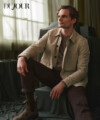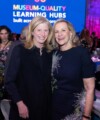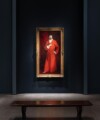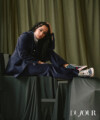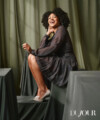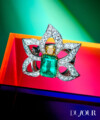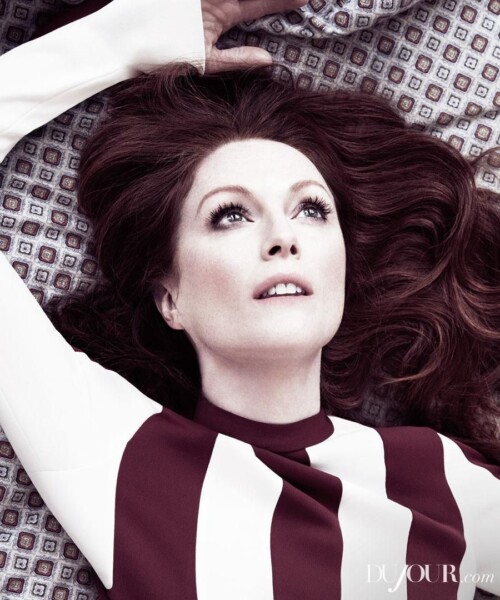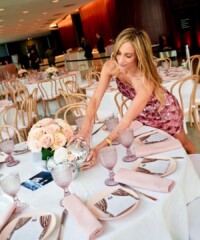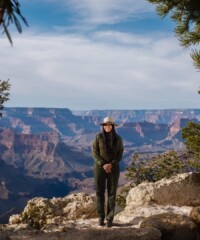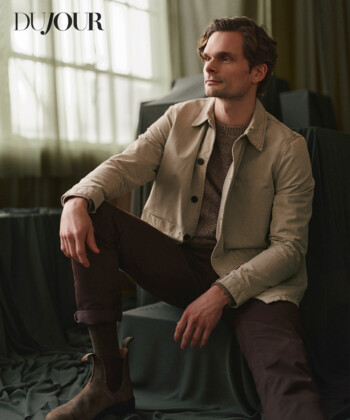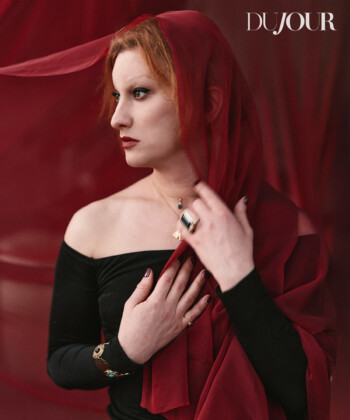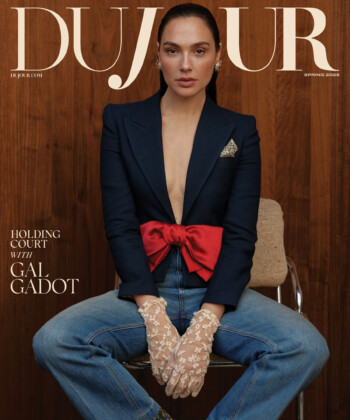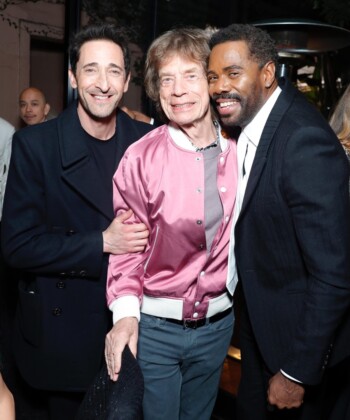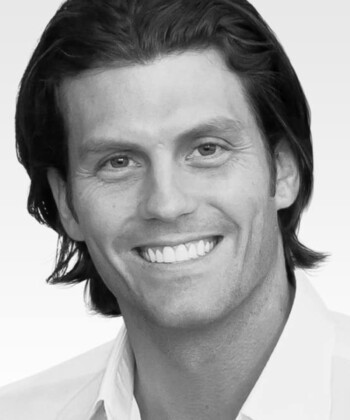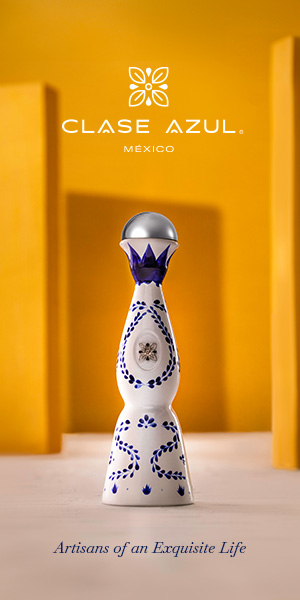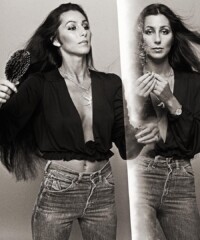We’re only about halfway through lunch when Julianne Moore says something, quite casually, that upends the story I’d been planning to write about her. We were discussing her current film, What Maisie Knew, in which she plays a self-obsessed musician, and we’d already spent some time talking about her Bible-banging role in the upcoming Carrie remake. But when I observe that both movies hinge, plot-wise, upon her characters’ spectacular failings as parents—”They’re both such terrible mothers,” I say, “but in such different ways”—she agrees and then shuts me down in a single breath. “I know,” she says cheerfully, “and I hate that comparison.”
Taken aback, I ask why. “Oh, just because it’s so reductive. These are two very different movies.” Needless to say, she’s right. And this is only one of several moments in our conversation, conducted over salads and zucchini fries at a cafe near her home in Manhattan’s West Village, in which Moore resists the easy and the neat in favor of the true. It’s an impulse that’s served the actress well over the course of her nearly three-decade career: Ever since getting her start in the mid-1980s as a pair of identical half sisters on the long-running soap opera As the World Turns, she’s won praise, and awards, for her fundamentally honest, sympathetic portrayals of women as varied as a drug-addicted porn star (in 1997’s Boogie Nights) and Sarah Palin (in 2012’s Game Change).
Scott McGehee, who co-directed Moore alongside creative partner David Siegel in What Maisie Knew—a contemporary adaptation of Henry James’ novel about a neglected young girl dealing with her parents’ bad divorce—says that he never doubted Moore’s ability to inhabit Susanna, a dissolute rock star. “This is one of the things that she does so well,” he explains. “She finds the human part of an unlikable character.” (She also learned how to sing and play guitar for the role, although she points out that her approach was pretty far from Method: “I needed to learn how to play three chords, and I worked really hard at learning those three chords, but I couldn’t play them for you now.”)
“She believes very much in being present in the moment of performance,” Siegel explains, “but she doesn’t carry it with her when she leaves.” Indeed, McGehee says that, between takes, Moore would swiftly drop character to be “a comforting colleague” to her young co-star, the talented newcomer Onata Aprile. “It was fun to watch her with her own kids, too,” he adds, referring to Caleb, 15, and Liv, 11. “The principal location was literally around the corner from her house, so they popped by every now and then, and she has a really lovely, warm relationship with them.”
Motherhood, Moore says, “was something that I always wanted to do. I didn’t know if I’d get married—I just didn’t innately feel like that was something I could be goal-oriented about—but I knew that I wanted to have children.” And ultimately, of course, she did decide to marry her kids’ father, the writer-director Bart Freundlich, but not until 2003, when the couple had already been together for seven years. “It starts to become societally challenging,” she says. “When you say partner, people ask, ‘Do you mean your business partner?’ So we’d be reduced to saying boyfriend and girlfriend, and then there are always issues with hospitals and health insurance, and it just starts to seem silly. We are a family. We are emotionally responsible for one another, so we wanted to be legally responsible for one another, too. I think the institution is what you make it.”
In person, Moore comes across as both warm and no-nonsense—her responses to several of my questions betray a very low-key frustration with the kinds of questions she’s always asked, but she’s genial nevertheless. “Do we have to talk about parenthood?” she wonders, after I push her to elaborate. “I don’t mind, but I do think it’s an extremely profound experience, something that’s difficult to encapsulate in a single interview.” Later, she worries that queries about parenting and getting older might be inherently sexist, regardless of intent. “Men aren’t asked about age,” she points out. “Men aren’t asked about their children. Not that these things aren’t important, but I do feel like it becomes reductive,” she says, returning to the same (not particularly common) word that she used earlier in our conversation, “when a woman’s life becomes, ‘Talk to me about your kids and how you feel about plastic surgery.’ ”
For the record, she is willing to answer. “I just think that it’s boring! I don’t say that to you—I say that to everyone. Our fear of aging is really a fear of dying; aging is a physical manifestation of decay, and I think that is what’s so upsetting to most people.” Of course, Moore herself looks as beautiful as ever at 52 and, quite possibly, even more distinctive. As Tom Ford, who frequently dresses the star for big events and also directed her in 2009’s A Single Man says, “When I looked at her through the [camera] lens it was startling: She is actually luminous.” (In a follow-up interview, Moore manages to make her contract with L’Oréal, for which she promotes, among other products, an anti-aging cream, seem perfectly in line with her principles. “They’re great because they have a range of women representing their brand,” she notes, “from very young women all the way up to Jane Fonda, who’s 75. It’s not about being beautiful for your age. It’s about being beautiful at your age.”)
She likewise has little patience for the idea that it’s difficult for an actress to locate good parts once she hits the far side of 40; examine her own CV and it’s easy to see why.
Although Moore worked steadily in her late twenties, moving from lead parts in miniseries and TV movies to third- or fourth-billed roles in high-quality popcorn flicks like The Hand That Rocks the Cradle or The Fugitive, it wasn’t until her early thirties that she appeared in Short Cuts, Vanya on 42nd Street and Safe, a cinematic hat trick of rich, subtle performances that established her as a dramatic force to be reckoned with. And it’s only in the past 14 years—since she turned 39—that she’s cemented her reputation as a major star, thanks to her indelible acting in critically acclaimed films like Magnolia, Far From Heaven, The Hours and The Kids Are All Right. “Good parts, really interesting parts, are difficult for anyone to find at any age,” she says, “because this business is not set up in such a way that it’s about finding great parts for actors and actresses.” Major studios, she continues, “are looking for a great product that they can sell globally. So I can’t sit here and rail against the industry, because I do think that there’s interesting stuff out there, and it’s not anybody’s job to find it for me but mine. You’re always responsible for trying to figure out what to do with your own career.”
Certainly she’s found plenty to do lately: Starting with The English Teacher, a quirky comedy that debuted on VOD in April and is currently in theaters, she’ll appear in no less than six films this year. Coming this October is Don Jon, Joseph Gordon-Levitt’s buzzed-about directorial debut, about a man who attempts to quit watching what used be called “adult films” at the behest of his girlfriend, played by Scarlett Johansson. (Moore plays a fellow student in the community-college class that the title character enrolls in, again under duress.) “When I first saw the script,” she says, “I knew it had something to do with porn, and I just thought, Ugh. But then I started to read it, and it was so funny and so lovely and so surprising. I said, ‘This isn’t about porn!’ I think it’s a great rumination on the nature of intimacy.” If her co-stars’ performances seem to have been heavily influenced by MTV’s Jersey Shore, whereas hers is far more naturalistic, that’s exactly the point. “A lot of people [in this movie] are behaving in a way that, culturally, they feel they should be behaving,” she explains. “What I liked about my character is that she’s at a place in her life where she can’t be anything less than 100 percent authentic.”
Also in October, she’ll venture to the dark side, playing a powerful witch in the family-oriented adventure film Seventh Son and the deranged mother of a telekinetic teenager (played by Chloë Grace Moretz) in Carrie. Like her director on that movie, Kimberly Peirce, Moore took her inspiration directly from Stephen King’s 1974 novel. “It’s really about social isolation and what that does to a person,” she says, speaking of both the book and the new adaptation, “and the kind of unhappiness and even rage that it can incite. What I hadn’t remembered is that Margaret is really someone who marginalized herself. The only world she knows is the world that she has with her daughter, and she’s doing everything she can to keep that world intact.” Finally, she’ll star opposite Liam Neeson in an airplane-set thriller called Non-Stop. (The film is a reunion of sorts for the two, who worked together in 2009’s Chloe, which, Neeson allows, “was a very, very different sort of film. But I love acting with her. She’s so easy to work with—she’s just always so real, and we giggle a lot. The crew loves her. She’s just a lovely burst of feminine energy on the set.”)
Given all of the above, and the fact that her performance in Game Change recently netted her an Emmy, a Golden Globe and a Screen Actors Guild award, it could reasonably be argued that Moore is in her prime. But I get the sense she wouldn’t necessarily appreciate hearing that. “We try to impose a narrative on everything where it doesn’t exist, because we like narrative,” she says, after I ask a general question about the arc of her career. “We love story—I particularly love story—and so we think, That was the beginning, and this is the middle, and then there’s going to be the conclusion. We even talk about it! Like, in magazines, they’ll say, ‘This next chapter of her life…’ Chapter? Like something ended, and you’re beginning something new, when really there’s just a continuum. The fact of the matter is, you can’t impose a narrative until someone’s dead, because you don’t know what’s going to happen.
“There’s not an arc,” she goes on, “just a line that moves forward, without being able to see past the horizon. That’s my philosophy these days: I don’t try to go ahead of that, because there’s no sense in it. Ahead of that, you don’t know what’s going to happen. It’s not true. It’s not real. It’s imagined.”
This way of thinking, she says, extends to more than just acting, although that career, she admits, is especially unpredictable. “There’s not much certainty,” she insists, even for someone as accomplished as she is. “You can have a great experience on something and then just be unhirable the next year. It could be over! People ask me, ‘Why would you worry about not working again?’ And I always say, ‘Because it’s not unprecedented.’ ”
But it doesn’t seem that she worries about unemployment so much as acknowledge that it’s a possibility, one that—in spite of her earlier assertion that it’s up to her to find her own parts—she knows she can’t necessarily control. “It’s funny,” she muses. “When you think about the steps you take to get somewhere, we’re not always clear. When I was 17, I decided, out of the blue, that I wanted to be an actor, and I was like, ‘OK. I’m going to go to acting school, and then I’m going to move to New York, and then I’m going to get an agent, and then I’m going to get a callback.’ Everything was always, ‘I’m going to do this, and then I’m going to do this,’ but not with a whole lot of sense of…” She pauses, then breaks into a smile. “If I saw myself sitting here at 52, talking about my career and how I’ve been doing it for the last 30 years, I would be like, ‘Are you kidding me? It happened?’ ”






